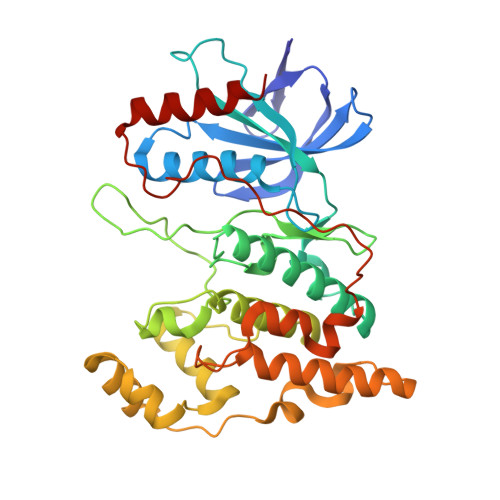Development of a Covalent Inhibitor of c-Jun N-Terminal Protein Kinase (JNK) 2/3 with Selectivity over JNK1.
Lu, W., Liu, Y., Gao, Y., Geng, Q., Gurbani, D., Li, L., Ficarro, S.B., Meyer, C.J., Sinha, D., You, I., Tse, J., He, Z., Ji, W., Che, J., Kim, A.Y., Yu, T., Wen, K., Anderson, K.C., Marto, J.A., Westover, K.D., Zhang, T., Gray, N.S.(2023) J Med Chem 66: 3356-3371
- PubMed: 36826833
- DOI: https://doi.org/10.1021/acs.jmedchem.2c01834
- Primary Citation of Related Structures:
7N8T, 8ELC - PubMed Abstract:
The c-Jun N-terminal kinases (JNKs) are members of the mitogen-activated protein kinase (MAPK) family, which includes JNK1-JNK3. Interestingly, JNK1 and JNK2 show opposing functions, with JNK2 activity favoring cell survival and JNK1 stimulating apoptosis. Isoform-selective small molecule inhibitors of JNK1 or JNK2 would be useful as pharmacological probes but have been difficult to develop due to the similarity of their ATP binding pockets. Here, we describe the discovery of a covalent inhibitor YL5084, the first such inhibitor that displays selectivity for JNK2 over JNK1. We demonstrated that YL5084 forms a covalent bond with Cys116 of JNK2, exhibits a 20-fold higher K inact / K I compared to that of JNK1, and engages JNK2 in cells. However, YL5084 exhibited JNK2-independent antiproliferative effects in multiple myeloma cells, suggesting the existence of additional targets relevant in this context. Thus, although not fully optimized, YL5084 represents a useful chemical starting point for the future development of JNK2-selective chemical probes.
Organizational Affiliation:
Department of Chemical and Systems Biology, Chem-H, and Stanford Cancer Institute, Stanford School of Medicine, Stanford University, Stanford, California 94305, United States.
















